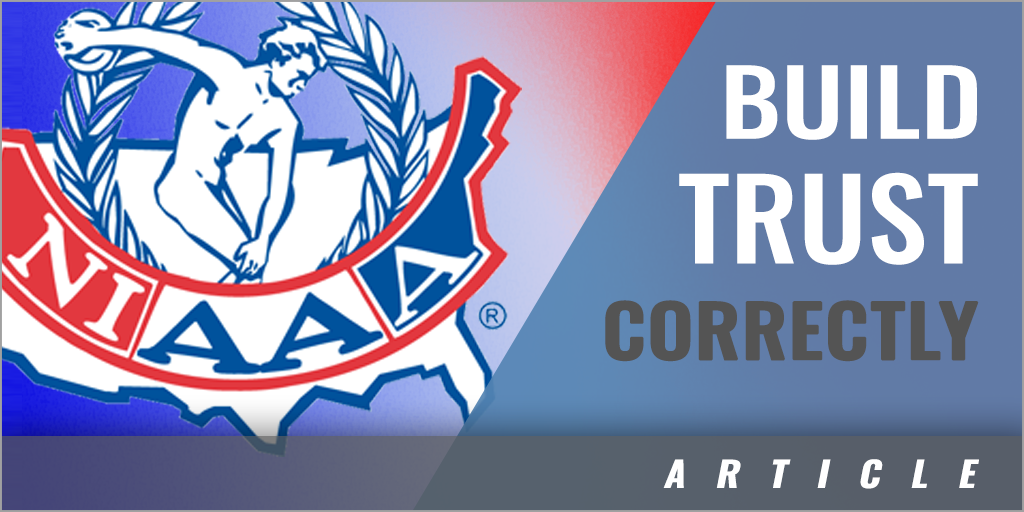|
By: Denny Ziegler, CAA - Strongsville High School (OH) In the realm of high school sports, trust serves as the foundation upon which successful and harmonious relationships are built between coaches, athletes, parents, and stakeholders. Establishing trust in a sports environment is crucial for fostering collaboration, open communication, and a positive team culture while adding team success and team championships. By focusing on three key strategies – competence, connections, and character – individuals can cultivate trust in a genuine and sustainable manner, leading to enhanced performance, mutual respect, and collective success. Competence Competence forms the first pillar of trust-building in high school sports, emphasizing the importance of expertise, knowledge, and proficiency in one's role. Coaches who demonstrate competence through their coaching skills, strategic acumen, and understanding of the game earn the trust and respect of athletes, parents, and stakeholders. By showcasing a strong grasp of coaching techniques, sports psychology, and game strategies, coaches instill confidence in their ability to lead, guide, and develop athletes to reach their full potential. Athletes, in turn, build trust by showcasing their commitment to training, their willingness to learn and improve, and their dedication to the team's success. By consistently demonstrating their skills, work ethic, and coachability, athletes earn the trust of their coaches, teammates, and supporters, creating a culture of accountability and excellence within the team. Parents and stakeholders contribute to trust-building through their support, engagement, and investment in the sports program. By demonstrating a genuine interest in the athletes' well-being, showing respect for the coaching staff, and actively participating in team activities, parents and stakeholders establish themselves as trusted allies in the pursuit of athletic success. Connections Building trust through connections focuses on fostering meaningful relationships, open communication, and a sense of camaraderie among coaches, athletes, parents, and stakeholders. Coaches who prioritize building connections with their athletes by listening attentively, providing feedback, and showing empathy create a supportive and inclusive team environment where trust can flourish. By investing time in getting to know each athlete as an individual, understanding their strengths, challenges, and aspirations, coaches lay the groundwork for trust and rapport to thrive. Athletes contribute to trust-building through their willingness to communicate openly, collaborate with teammates, and respect the authority of their coaches. By engaging in constructive dialogue, offering and receiving feedback, and demonstrating a positive attitude towards teamwork, athletes strengthen the bonds of trust within the team, fostering unity and cohesion on and off the field. Parents and stakeholders play a vital role in trust-building by fostering positive relationships with coaches, supporting athletes unconditionally, and engaging in constructive communication with the sports program. By establishing lines of communication, demonstrating respect for coaching decisions, and actively participating in team events, parents and stakeholders contribute to a culture of trust, collaboration, and mutual support within the sports community. Character The third key strategy for building trust in high school sports is character, which encompasses integrity, honesty, and ethical behavior in all interactions. Coaches who exhibit strong moral character, uphold ethical standards, and lead by example earn the trust and admiration of their athletes, parents, and stakeholders. By demonstrating consistency, transparency, and fairness in their coaching practices, coaches establish themselves as trustworthy leaders who prioritize the well-being and growth of their athletes above all else. Athletes build trust through their integrity, sportsmanship, and respect for the game. By adhering to ethical standards, displaying good sportsmanship, and honoring the rules and regulations of their sport, athletes earn the trust and respect of their coaches, teammates, and opponents, showcasing their commitment to excellence and fair play. Parents and stakeholders contribute to trust-building through their ethical conduct, support for the sports program, and commitment to upholding the values of sportsmanship and respect. By modeling positive behavior, demonstrating sportsmanship in their interactions, and promoting a culture of integrity and fair play, parents and stakeholders reinforce the importance of trust, character, and ethical behavior within the sports community. In conclusion, building trust the right way in high school sports requires a concerted effort to prioritize competence, connections, and character in all interactions with coaches, athletes, parents, and stakeholders. By focusing on expertise, relationships, and integrity, individuals can create a culture of trust, respect, and collaboration that fosters success, unity, and growth within the sports program. Through a commitment to building trust through competence, connections, and character, high school sports communities can cultivate strong, enduring relationships that lay the foundation for excellence, sportsmanship, and collective achievement. |







